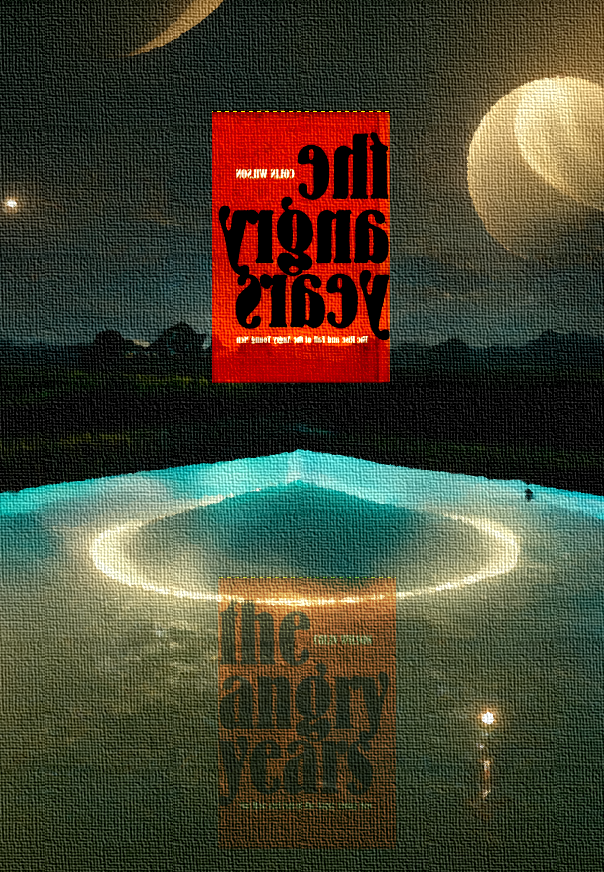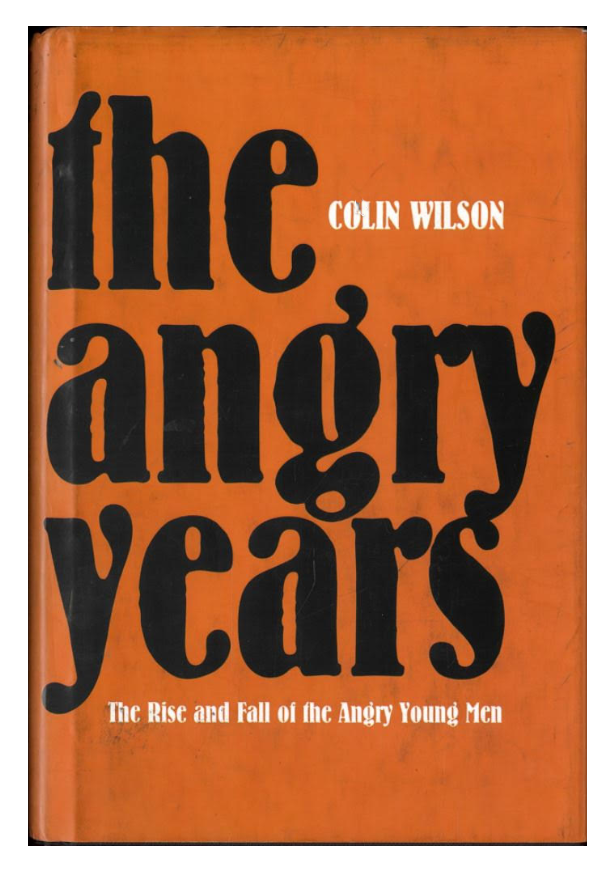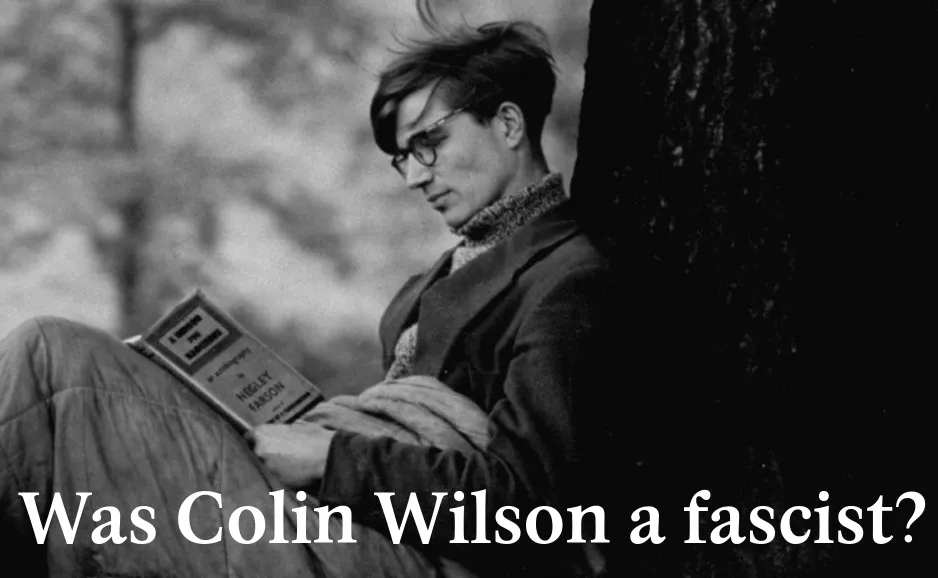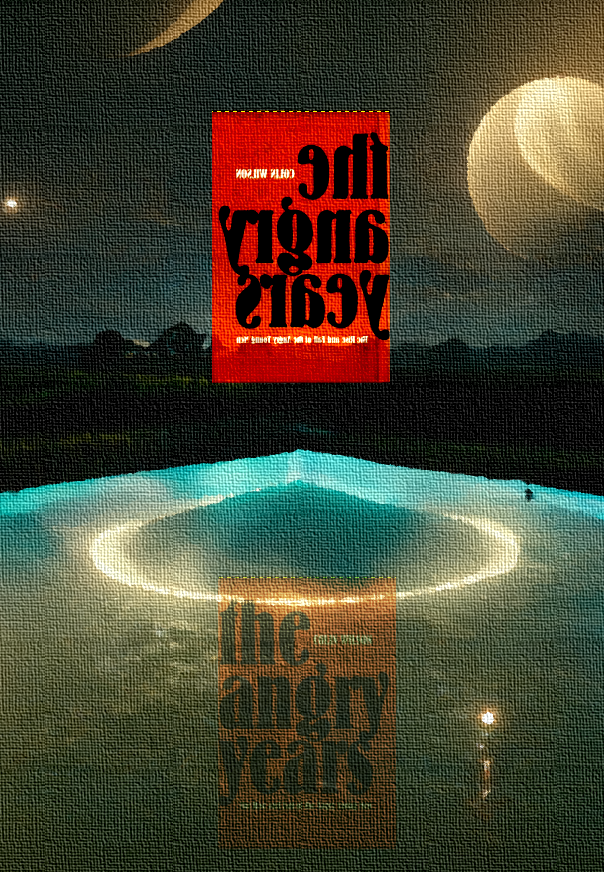
The sky pool
down to the sky, up to the pool… —and Colin Wilson

I was cataloguing Colin Wilson’s memoir The Angry Years, and I thought, who is he again?
Colin Wilson is one of those boomer generational figures who have had little impact on my on cohort of genXers. His books would have passed my gaze in second hand book shops, in the 80s & 90s, and these books were from his more mystical and paranormal period, and so I averted my gaze. Easy to do in a secondhand bookshop.
He was a name I knew, but never bother to find out assuming he was some old hippie fart, as punks in the 70s called them. So I went on a bear hunt.
https://en.wikipedia.org/wiki/https://en.wikipedia.org/wiki/Colin_Wilson https://www.theguardian.com/books/2004/may/30/biography.features1 https://aeon.co/essays/was-colin-wilson-a-fascist-or-was-he-fascist-adjacent

What I found interesting in reading them turn out to be a reflection, which shocked me, and thus became, quaking reflection, the prompt for this post, asking: will a greater diagnosis or recognition of a condition lead to less opportunities for eccentrics to arise convinced of their own greatness/specialness.
Like, if Colin had got good help when young, would I have had the chance to avert my gaze in second-hand bookshops?
Here, for hypothetical argument’s sake, if Colin Wilson had a helpful diagnosis as a child, would he have ever written the outsider and gained a platform/career as one such, if he was told, actually, “you're only special as far as it goes.”
“It” being a diagnosis.
We have friends whose gifted children have never caused them bother enough to seek a diagnosis per se, but then, the parents had at least a suspicion, if not a life, and so could temper the specialness, with direct personal intervention.
Raising children is about worlding them.
The reason given to ignore a pathway to diagnoses is to avoid labels, and to relax the boxing in of expectations. The downside is never dealing with it.
I am using Colin Wilson as an example of the sin of never-dealing-with-it. The result is I have to break off and starting talking about an erstwhile distinct pathology, while the first remains unnamed for now, where self-absorption verges too much into actual narcissism.
I will use a literary example because I have met a real life example recently in the same week I was cataloguing the Colin Wilson book. And that real life one… well — is this a mirror I see before me?
Anyway, the mirror image asks, breaking my line of thought, what has this to do with the… —gap?
Well, I answer, it seems what we thrown into the gap depends on our style/tilt/inclination. Myself, for example, I throw mirrors into it in order to shock me into sense.
But narcissists throw themselves into the gap. Well, that is how it looks to the rest of us. For the narcissists themselves there is no gap, they are the world, and not merely the centre of it. Self-centred is what losers do. Not what special personalities do.
For me, narcissists and psychopaths provide a straight rule with which to measure personalities with reference to the gap. Their lack of empathy, that otherwise builds worlds and peoples' peopleness, can be a key feature in mapping the gap some call a soul.
Or at least in what we do next to it when we should ourselves into the world. For both reality and empathy each break the nexus self=world, which is unbreakable in most narcissists who are no longer toddlers, and remains unbroken in some of the self-absorbed. Co-morbidity is a thing.
I'll reference narcissism a lot as a reference beam in this blog of mine, because empathy builds the world. As we compose ourselves… —body & umwelt.
In this post the comparison is the fine division between narcissism (including psychopathy) and what passes for self-absorption among the autistic (here now the diagnosis is finally named), where the self is a special project among a few others.
In that, where the narcissist is incorrigible, if one explained the pool to the the autistic kid, then, perhaps, they can see the filter that they themselves place over the world. To then point at it, like it is a blueprint projected onto the sky, and so, possibly, the autistic kid may well go, if sheepishly, “oh... yeah, I guess... never though about it like that before… —hmmmmn.”
Shock of recognition.
Narcissists reject the possible reality of any such a viewpoint, reflective filter or not.
Just a reminder I am not diagnosing anyone just discussing what might be happening.
The narcissist and psychopath stare down at themselves in the pool, partly because there is nothing else is in the world. It's not that they are even in the world and the world orbits around their sunshine. There is nothing else but them, so what else can there be. I.E. narcissists do not think about things that are not there in the world, like you or me, so the world does not revolved around them because they are the world, why would they spin about and around themselves? Do singularities spin? That’s not how it looks from inside.
You are not them so your pain does not exist because the narcissist cannot feel it, the sadistic psychopathy who enjoys your pain is an outlier, and even then it is an abstract pain, they do not know how it feels but they think they do because they are special. It make them laugh.
Narcissists do not fall in love with their reflection either, not really, I mean it's a way to explain it all to someone who has fallen in love, what a narcissist is, but they do not fall in love, for they are love, and their reality just goes to show how special they are— to themselves.
There is another type of self-absorption, which can fall into narcissism but it has a different vector and a different composition, even if it converges on the poolside where narcissists sunbathe in their arse-ended supply.
This arises out of autistic introversion, and they do not look down into the pool, nodding like a flower, but up at the sky, open-eyed, but as they are in the pool, they see themselves in the sky… —not realising it is a reflection. They mistake themselves for the world.
They think they are looking at the world and see themselves in it somehow without noticing it is a reflection, i.e. without reflection.
It’s curable. Totally.

I map what we do around the… —gap.
The first thing we throw into the gap is nothing. That makes it useful as a vessel. Throwing god into this container comes much, much later when men of practical power invent belief as way to communicate government departmental orders, or the church, as some call it, to the lower orders.
The… —gap is a midden, a landfill site, a placed removed…
Anyway, at some level this mapping recognises that the world is made in the same move that the person is made, not that they are the same thing they are different outcomes of the same process… —being alive. Except I'll take the case of the narcissist as a personality disorder as evidence in favour of my argument of how things are in the world. And how that relates to all the me's hereabouts, not that this describes ‘reality’ but it may well describe the world, and other things that do not exist.
Where I find myself unreflected, I can reflect now. Reality does that. Reality worlds that back at me, and you.
Colin Wilson. The Angry Years: The Rise and Fall of the Angry Young Men. London: Robson Books, 2007. 9781861059727
Postscript on deep reflection
https://thereader.mitpress.mit.edu/aldous-huxleys-deep-reflection/
Aldous Huxley’s capacity to enter — at will — the dissociated state he called “deep reflection” is of value because Huxley was a painstaking self-observer. Anyone who cut his novelistic teeth (as I did) on such brilliant books as “Antic Hay” or “Point Counter Point” will share my admiration of Huxley’s wit, his literary elegance, and above all, his interest in interpersonal relationships. He is a very special kind of expert witness to his own unusual states of consciousness, which he actively cultivated in the service of his writing. Because Huxley’s interest in the vicissitudes of altered states extended to mysticism and to psychedelic drugs, he is an ideal contributor to our inquiry into the Dream Drugstore. One final point: Huxley was so open that he was willing to collaborate with the hypnosis expert Milton Erickson, despite having his own biases. Erickson’s involvement provides a valuable and welcome degree of objectivity.
Post originally appeared at substack in 2023.
